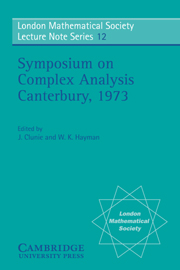Book contents
- Frontmatter
- Contents
- Preface
- Part I Contributions of participants
- A minimal-area problem in conformal mapping
- A remark on schlicht functions with quasiconformal extensions
- Some extremal problems for univalent functions, harmonic measures, and subharmonic functions
- On coefficient problems for certain power series
- Approximation by analytic functions uniformly continuous on a set
- A meromorphic function with assigned Nevanlinna deficiencies
- Estimation of coefficients of univalent functions by Tauberian remainder theorems
- The Padé table of functions having a finite number of essential singularities
- Extremal problems of the cos πρ-type
- A cos πλ-problem and a differential inequality
- Applications of Denjoy integral inequalities to growth problems for subharmonic and meromorphic functions
- A theorem on mini |z| log|f(z) |/T(r, f)
- The Lp-integrability of the partial derivatives of a quasiconformal mapping
- A Hilbert space method in the theory of schlicht functions
- An extremal problem concerning entire functions with radially distributed zeros
- Local behavior of subharmonic functions
- A general form of the annulus theorem
- Two problems on HP spaces
- Approximation on curves by linear combinations of exponentials
- Two results on means of harmonic functions
- The Fatou limits of outer functions
- A proof of |a4| ≤ 4 by Loewner's method
- Completeness questions and related Dirichlet polynomials
- On the boundary behaviour of normal functions
- Joint approximation in the complex domain
- Some linear operators in function theory
- Analogues of the elliptic modular functions in R3
- On some phenomena and problems of the powersum-method
- Meromorphic functions with large sums of deficiencies
- On D. J. Patil's remarkable generalisation of Cauchy's formula
- Analytic functions and harmonic analysis
- Part II Research problems in function theory
Analogues of the elliptic modular functions in R3
from Part I - Contributions of participants
Published online by Cambridge University Press: 04 May 2010
- Frontmatter
- Contents
- Preface
- Part I Contributions of participants
- A minimal-area problem in conformal mapping
- A remark on schlicht functions with quasiconformal extensions
- Some extremal problems for univalent functions, harmonic measures, and subharmonic functions
- On coefficient problems for certain power series
- Approximation by analytic functions uniformly continuous on a set
- A meromorphic function with assigned Nevanlinna deficiencies
- Estimation of coefficients of univalent functions by Tauberian remainder theorems
- The Padé table of functions having a finite number of essential singularities
- Extremal problems of the cos πρ-type
- A cos πλ-problem and a differential inequality
- Applications of Denjoy integral inequalities to growth problems for subharmonic and meromorphic functions
- A theorem on mini |z| log|f(z) |/T(r, f)
- The Lp-integrability of the partial derivatives of a quasiconformal mapping
- A Hilbert space method in the theory of schlicht functions
- An extremal problem concerning entire functions with radially distributed zeros
- Local behavior of subharmonic functions
- A general form of the annulus theorem
- Two problems on HP spaces
- Approximation on curves by linear combinations of exponentials
- Two results on means of harmonic functions
- The Fatou limits of outer functions
- A proof of |a4| ≤ 4 by Loewner's method
- Completeness questions and related Dirichlet polynomials
- On the boundary behaviour of normal functions
- Joint approximation in the complex domain
- Some linear operators in function theory
- Analogues of the elliptic modular functions in R3
- On some phenomena and problems of the powersum-method
- Meromorphic functions with large sums of deficiencies
- On D. J. Patil's remarkable generalisation of Cauchy's formula
- Analytic functions and harmonic analysis
- Part II Research problems in function theory
Summary
Introduction
The purpose of this talk is to present mappings g of the upper half space H = {X ∈ R3: x3 > 0 } into R3 which resemble in some respects the elliptic modular function and raise some questions in the theory of quasiregular mappings. Each of the mappings g has the following properties:
(1) g is continuous, discrete, open, sense-preserving and has a bounded dilatation in H.
(2) g defines a closed map of H onto R3\P for some set P ⊂ R3 of finite cardinality.
(3) there exists a discrete group G of Mobius transformations acting on H with a non-compact fundamental domain of finite hyperbolic volume in H such that g° A = g for all A ∈ G.
(4) g has no limit at any point b ∈ ∂H.
(1) says that g is quasiregular in the sense of Martio, Rickman and Väisäiä[l]. This means that g ∈ ACL3 and |g'(x)|3 < K(x, g) a. e. in H for some K ∈ [1, ∞), where |g'(x)| denotes the sup norm of the formal derivative g'(x), and J(x, g) = det g'(x).
The class of quasiregular mappings in R3 is a reasonable generalization of holomorphic functions in C; and with (2)–(4) we may consider the mappings g as analogues of the elliptic modular function. However, contrary to the elliptic modular function, none of the mappings g that are constructed here is a local homeomorphism. Martio and I show in [4] that no quasiregular mapping in Rn, n > 3, which satisfies (3) is a local homeomorphism.
- Type
- Chapter
- Information
- Proceedings of the Symposium on Complex Analysis Canterbury 1973 , pp. 125 - 128Publisher: Cambridge University PressPrint publication year: 1974

